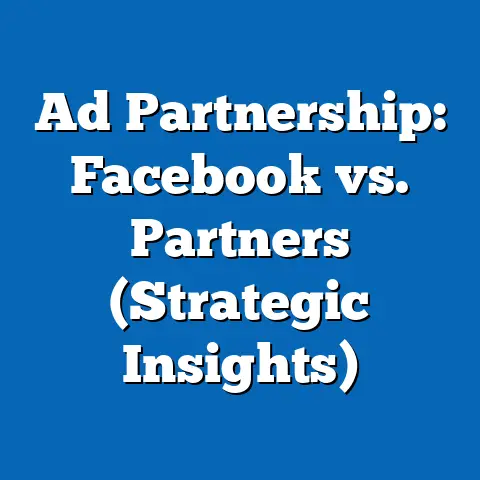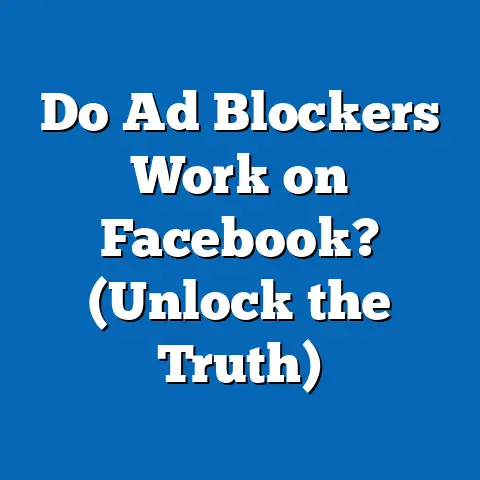Navigating Political fb ad Disclaimers (Essential Insights)
Facebook advertising has become a cornerstone of modern political campaigns.
I’ve seen firsthand how a well-crafted ad can sway public opinion, mobilize voters, and ultimately, impact election outcomes.
However, the digital landscape is fraught with complexities, especially when it comes to political advertising.
One wrong step and your campaign could face hefty fines, public backlash, or even ad platform bans.
I remember working with a local mayoral candidate a few years ago.
Their campaign was gaining serious traction, largely due to a series of compelling Facebook ads focused on community development.
But they almost derailed their momentum by overlooking the fine print: Facebook’s political ad disclaimer requirements.
Fortunately, we caught the oversight just in time, implemented the necessary disclaimers, and the campaign went on to a successful victory.
This experience underscored the critical importance of understanding and adhering to Facebook’s policies.
In today’s political climate, where misinformation and transparency are under constant scrutiny, mastering Facebook’s ad disclaimer policies is non-negotiable.
This guide will walk you through everything you need to know to navigate these regulations, ensuring your political ads are not only effective but also compliant and trustworthy.
Let’s dive in!
Understanding Facebook’s Ad Policies
Facebook’s advertising policies are a constantly evolving landscape, especially when it comes to political content.
It’s crucial to understand the specific rules governing political ads to ensure compliance and avoid potential penalties.
So, what exactly does Facebook consider a “political ad”?
According to Meta, political ads are defined as those that:
- Refer to candidates, elections, or political figures.
- Advocate for or against legislation or policies.
- Address social issues of national importance.
This definition is intentionally broad to capture a wide range of content that could influence public opinion.
It’s not just about explicitly endorsing a candidate; it also includes ads discussing controversial topics or promoting a particular viewpoint on a policy issue.
The rationale behind these stringent policies is to promote transparency and accountability in political advertising.
Facebook, like other social media platforms, has faced criticism for its role in spreading misinformation and allowing foreign interference in elections.
To address these concerns, Facebook implemented stricter rules for political ads, including mandatory disclaimers, verification processes, and ad libraries.
These policies differ significantly from those applied to other types of advertisements.
For example, commercial ads typically focus on promoting products or services and are subject to different regulations regarding truthfulness and substantiation.
Political ads, on the other hand, are scrutinized for their potential to influence public discourse and electoral outcomes.
Understanding these distinctions is the first step in ensuring your political ads comply with Facebook’s policies and contribute to a more transparent and informed political landscape.
Takeaway: Familiarize yourself with Facebook’s definition of political ads and the rationale behind its strict policies.
This knowledge is the foundation for building compliant and effective campaigns.
The Importance of Disclaimers
Disclaimers are not just a legal formality; they are a critical component of responsible political advertising.
They serve several important functions, contributing to transparency, building trust, and ensuring accountability.
Transparency is paramount in political discourse.
Disclaimers clearly identify who is behind an ad, allowing viewers to assess the message with full knowledge of the source.
This transparency helps prevent hidden agendas and undisclosed influences from manipulating public opinion.
Trust is another key element.
When viewers know who is paying for an ad, they are more likely to trust the information presented.
Ads without disclaimers can appear shady or untrustworthy, potentially alienating voters.
Accountability is also essential.
By requiring disclaimers, Facebook holds advertisers accountable for the content they promote.
This accountability encourages responsible advertising practices and discourages the spread of misinformation.
In fact, according to a recent study by the Pew Research Center, 76% of Americans believe it is important for political ads to clearly identify their sponsors.
This statistic underscores the public’s demand for transparency and accountability in political advertising.
Failing to include proper disclaimers can have serious legal implications.
In the past few years, several political campaigns have faced penalties and public backlash for non-compliance.
In one notable case, a political organization was fined $10,000 for running ads without proper disclaimers, highlighting the financial risks associated with non-compliance.
Takeaway: Disclaimers are not optional; they are essential for building trust, ensuring transparency, and avoiding legal repercussions.
Types of Disclaimers Required
Navigating the world of political ad disclaimers can feel like deciphering a secret code.
But don’t worry, I’m here to break it down for you.
Facebook requires different types of disclaimers depending on the content and context of your ad.
Let’s explore the most common ones:
- “Paid for by” Disclaimers: This is the most basic type of disclaimer, and it’s usually required for all political ads.
It simply states who paid for the ad, such as “Paid for by [Campaign Name]” or “Paid for by [Organization Name].” - Funding Source Information: In some cases, Facebook may require additional information about the funding source, especially if the ad is paid for by a political action committee (PAC) or a non-profit organization.
This could include disclosing the names of major donors or the percentage of funding from different sources. - Content-Related Disclaimers: If your ad contains sensitive or controversial topics, such as discussions about race, religion, or immigration, Facebook may require additional disclaimers to provide context or clarification.
For example, if your ad includes statistics about crime rates, you might need to include a disclaimer stating the source of the data and any limitations or biases associated with it.
Here are a few real-world examples of how these disclaimers are formatted and displayed on Facebook ads:
- Example 1: A Facebook ad supporting a candidate for local office might include the disclaimer “Paid for by the [Candidate Name] Campaign Committee.” This clearly identifies the source of the ad and provides transparency to viewers.
- Example 2: A Facebook ad advocating for a particular policy might include the disclaimer “Paid for by [Organization Name], a non-profit organization dedicated to [Policy Area].” This provides additional context about the organization’s mission and goals.
- Example 3: A Facebook ad discussing controversial issues might include the disclaimer “This ad contains opinions and viewpoints that may not reflect the views of all viewers.
Please consider multiple perspectives before forming your own opinion.” This disclaimer acknowledges the potential for disagreement and encourages viewers to think critically.
Takeaway: Familiarize yourself with the different types of disclaimers required for political ads and ensure your ads include the appropriate disclaimers based on their content and context.
Step 1: Identify whether your ad qualifies as a political ad.
As we discussed earlier, Facebook has a broad definition of political ads.
If your ad refers to candidates, elections, legislation, or social issues of national importance, it likely qualifies as a political ad and requires a disclaimer.
When in doubt, it’s always better to err on the side of caution and include a disclaimer.
Step 2: Register your organization or campaign with Facebook for ad verification.
Before you can run political ads on Facebook, you need to register your organization or campaign and go through a verification process.
This involves providing documentation to prove your identity and legitimacy.
You’ll need to submit official documents such as your organization’s registration certificate, tax ID, or campaign finance reports.
The verification process can take several days, so it’s important to start early.
Step 3: Craft your disclaimers according to Facebook’s guidelines.
Once you’re verified, you can start crafting your disclaimers.
Make sure your disclaimers are clear, concise, and accurate.
Use simple language that is easy for viewers to understand.
Include all the necessary information, such as the name of the organization or campaign paying for the ad, as well as any funding source information required by Facebook.
Double-check your disclaimers to ensure they comply with Facebook’s guidelines.
Step 4: Submit your ads for review and ensure all components adhere to Facebook’s policies.
Before your ads go live, they’ll need to be reviewed by Facebook.
This review process can take several hours or even days, so plan accordingly.
Make sure your ads adhere to all of Facebook’s advertising policies, including those related to political content, disclaimers, and targeting.
If your ad is rejected, you’ll receive feedback from Facebook explaining why.
Use this feedback to make the necessary changes and resubmit your ad for review.
Step 5: Monitor your ads for compliance and be prepared to respond to any issues that arise.
Even after your ads are approved and running, it’s important to monitor them for compliance.
Facebook may flag ads that violate its policies, even if they were initially approved.
If your ad is flagged, you’ll need to respond quickly to address the issue.
This could involve updating your disclaimer, adjusting your targeting, or even removing the ad altogether.
Here are a few common pitfalls to avoid during this process:
- Using vague or ambiguous language in your disclaimers: Be specific and transparent about who is paying for the ad.
- Failing to disclose all required funding source information: Make sure you comply with Facebook’s requirements for disclosing funding sources, especially if you’re a PAC or non-profit organization.
- Ignoring Facebook’s feedback during the review process: Pay attention to the feedback you receive from Facebook and make the necessary changes to your ads.
- Neglecting to monitor your ads for compliance after they’ve been approved: Stay vigilant and be prepared to respond to any issues that arise.
Takeaway: Compliance with Facebook’s disclaimer requirements is an ongoing process.
Follow these steps to ensure your political ads are not only effective but also compliant and trustworthy.
Case Studies and Real-Life Examples
Let’s bring this all together with some real-world examples.
Analyzing successful and unsuccessful campaigns can provide valuable insights into navigating Facebook’s disclaimer requirements.
Case Study 1: The “Grassroots for Green Energy” Campaign
This campaign aimed to raise awareness about the benefits of renewable energy and encourage voters to support policies promoting clean energy.
Their Facebook ads featured compelling visuals, informative content, and clear calls to action.
Crucially, they meticulously adhered to Facebook’s disclaimer requirements.
What they did right:
- Transparency: They prominently displayed the “Paid for by Grassroots for Green Energy” disclaimer on all their ads.
- Funding Disclosure: They provided additional information about their funding sources on their website, which was linked from their Facebook page.
- Compliance Monitoring: They regularly monitored their ads for compliance and responded quickly to any issues flagged by Facebook.
The outcome:
- The campaign achieved significant engagement and reach, with their ads reaching over 1 million voters.
- They successfully raised awareness about renewable energy and influenced public opinion in favor of clean energy policies.
- They avoided any penalties or negative publicity due to non-compliance.
Case Study 2: The “Vote for Change” Campaign
This campaign supported a candidate for local office who promised to bring change to the community.
Their Facebook ads featured strong endorsements from local leaders and highlighted the candidate’s policy proposals.
However, they initially overlooked Facebook’s disclaimer requirements.
What went wrong:
- Lack of Disclaimers: Their early ads did not include any disclaimers, which raised concerns about transparency and accountability.
- Negative Backlash: Some voters criticized the campaign for its lack of transparency, questioning the source of funding for the ads.
- Facebook Intervention: Facebook flagged several of their ads for non-compliance and temporarily suspended their ad account.
The outcome:
- The campaign suffered a significant setback, losing momentum and credibility.
- They had to scramble to update their ads with the necessary disclaimers and regain Facebook’s approval.
- The incident damaged the candidate’s reputation and made it more difficult to win over voters.
Takeaway: These case studies highlight the importance of adhering to Facebook’s disclaimer requirements.
Campaigns that prioritize transparency and compliance are more likely to succeed, while those that overlook these regulations risk facing penalties, negative publicity, and damage to their reputation.
Conclusion
Navigating Facebook’s political ad disclaimer policies may seem daunting, but it’s an essential part of running a responsible and effective campaign.
By understanding Facebook’s policies, prioritizing transparency, and following the steps outlined in this guide, you can ensure your political ads comply with regulations, build trust with your audience, and achieve your campaign goals.
Remember, compliance is not just about avoiding penalties; it’s about fostering a more transparent and informed political landscape.
Embrace the process as an opportunity to build credibility and connect with voters on a deeper level.
So, go forth and create impactful political ads that not only resonate with your audience but also adhere to the highest standards of transparency and accountability.
Your campaign, and our democracy, will be better for it.






